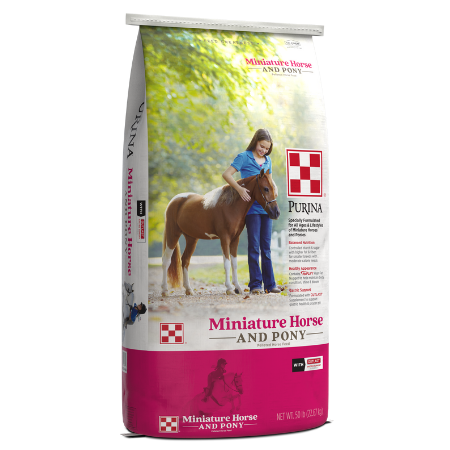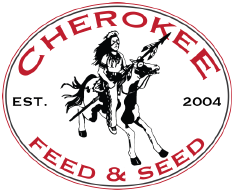Purina Miniature Horse and Pony
 Purina Miniature Horse and Pony horse feed is specifically formulated to meet the unique needs of miniature horses and ponies. It is ideal for equine who tend to be more metabolically efficient than large horses. Additionally, this feed is a great choice for horses that require the nutrition necessary for growth, gestation, lactation, breeding, and competition. Learn more at Purina Mills.
Purina Miniature Horse and Pony horse feed is specifically formulated to meet the unique needs of miniature horses and ponies. It is ideal for equine who tend to be more metabolically efficient than large horses. Additionally, this feed is a great choice for horses that require the nutrition necessary for growth, gestation, lactation, breeding, and competition. Learn more at Purina Mills.
Feed Form: Pellets and Extruded Nuggets
Recommended For: Miniature Horses and Ponies
Stop into Cherokee Feed & Seed with two locations in Gainesville and Alpharetta, Georgia for your supply of Purina Miniature Horse and Pony. Have questions? Be sure to contact us and a helpful member of our staff will guide you to the right horse feed for your equine.
Features
Added Beet Pulp
Provides an excellent source of fermentable fiber for slow release energy
Concentrate Feed
Designed to be fed with hay or pasture
Controlled Sugar and Starch
May help reduce the risk of adverse health effects caused by the management error of overfeeding
Highly Digestible Ingredients
Provide nutrient density and support proper digestion
Highly Palatable
Premium formulation made with the highest-quality ingredients
High-Quality Protein
With a desirable amino acid profile to support strong muscle growth, shiny coat and healthy hooves
Nutritionally Balanced
Provides 100% of the required nutrients for mini horses and ponies when fed as directed so no additional supplements are necessary
Based on “Nutrient Requirements of Horses Sixth Revised Edition–2007” published by the National Research Council
Purina® Amplify® High-Fat Nugget
A proprietary blend of vegetable oils, flax seed and rice bran for an optimal fatty acid profile to support strong immune function
Analysis
| CRUDE PROTEIN | MIN | 13.50% |
| LYSINE | MIN | 0.80% |
| CRUDE FAT | MIN | 4.50% |
| CRUDE FIBER | MAX | 18.00% |
| CALCIUM (CA) | MIN | 0.80% |
| CALCIUM (CA) | MAX | 1.30% |
| PHOSPHORUS (P) | MIN | 0.65% |
| COPPER (CU) | MIN | 75 PPM |
| SELENIUM (SE) | MIN | 0.60 PPM |
| ZINC (ZN) | MIN | 270 PPM |
| VITAMIN A | MIN | 6000 IU/LB |
| VITAMIN E | MIN | 125 IU/LB |
Directions
| Lifestyle | 100 | 200 | 300 | 400 | 500 | 600 | 700 |
|---|---|---|---|---|---|---|---|
| Minimum Hay or Equivalent Pasture (lbs/day)* | 1.2 | 2.4 | 3.6 | 4.8 | 6.0 | 7.2 | 8.4 |
| Miniature Horse and Pony Feed (lbs/day)** | |||||||
| Maintenance | 0.4 | 0.9 | 1.3 | 1.7 | 2.1 | 2.6 | 3.0 |
| Light Work | 0.7 | 1.3 | 2.0 | 2.6 | 3.3 | 4.0 | 4.6 |
| Moderate Work | 0.9 | 1.8 | 2.7 | 3.6 | 4.5 | 5.4 | 6.4 |
| Early Gestation (first 250 days) | 0.4 | 0.9 | 1.3 | 1.7 | 2.1 | 2.8 | 3.2 |
| Late Gestation (last 90 days) | 0.7 | 1.4 | 2.0 | 2.7 | 3.4 | 4.1 | 4.7 |
| Lactation (when fed separately)*** | 1.5 | 3.0 | 4.4 | 5.9 | 7.4 | 8.9 | 10.4 |
| Breeding Stallion | 0.8 | 1.6 | 2.4 | 3.1 | 3.9 | 4.7 | 5.5 |
| GROWING MINIATURE HORSES/PONIES | |||||||
| Weaned Foal | |||||||
| Weight of Horse in Pounds | 50 | 100 | 150 | 200 | 250 | 300 | 350 |
| Minimum Hay or Equivalent Pasture (lbs/day)* | 0.6 | 1.2 | 1.8 | 2.4 | 3.0 | 3.6 | 4.2 |
| Miniature Horse and Pony Feed (lbs/day)** | 0.6 | 1.1 | 1.7 | 2.3 | 2.8 | 3.4 | 4.0 |
| Yearling | |||||||
| Weight of Horse in Pounds | 75 | 150 | 225 | 300 | 375 | 450 | 525 |
| Minimum Hay or Equivalent Pasture (lbs/day)* | 0.9 | 1.8 | 2.7 | 3.6 | 4.5 | 5.4 | 6.3 |
| Miniature Horse and Pony Feed (lbs/day)** | 0.8 | 1.6 | 2.3 | 3.1 | 3.9 | 4.7 | 5.4 |
| Two-year-old | |||||||
| Weight of Horse in Pounds | 85 | 175 | 250 | 350 | 425 | 525 | 600 |
| Minimum Hay or Equivalent Pasture (lbs/day)* | 1.0 | 2.1 | 3.0 | 4.2 | 5.1 | 6.3 | 7.2 |
| Miniature Horse and Pony Feed (lbs/day)** | 0.7 | 1.4 | 2.1 | 2.7 | 3.5 | 4.1 | 4.8 |
For Best Feeding Results:
- Feed at regular times. Do not feed more than 0.5 lbs per 100 lbs of body weight in one serving. Divide total daily feeding into at least two servings with three daily servings preferred. Be sure to weigh your feed using a scale. A small scale can be purchased in the fishing department of many sporting goods stores.
- Feed horse in a natural position from troughs placed at normal head height or lower. Do NOT feed free-choice (all the horse wants).
- Reduce and/or delay feeding a horse that is hot, excited or showing pain, fever or diarrhea. Consult your veterinarian if any problems arise. Prevent rapid eating.
- Always feed a minimum of 1.0 to 1.2 lbs per 100 lbs of body weight of good quality, clean hay or pasture.
- Inadequate amounts of poor quality hay may lead to colic and other digestive disturbances.
- Have plenty of fresh, clean water available at all times, except immediately after intense physical exercise.
- Provide your horse with access to salt.
- Maintain a regular deworming program, have the horses's teeth examined annually and consult your veterinarian on a regular basis.
Contact Us
Navigation
- About
- Hay
- Products
- Store location
- Delivery Services
- Financing
- Specials
- Events
- News
- Contact
- Privacy Policy
